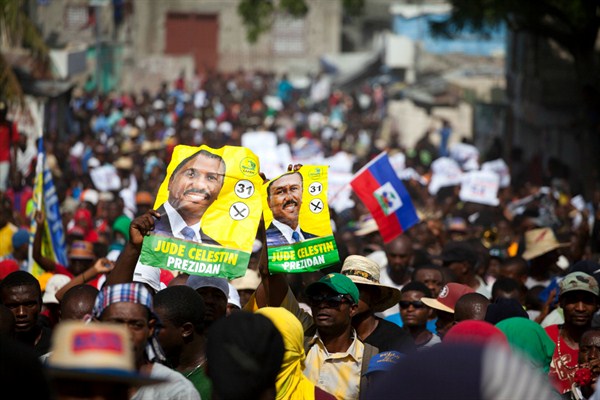The outcome of the first round of Haiti’s presidential elections, which were held Oct. 25, is still uncertain. According to the Provisional Electoral Council, known by its French acronym CEP, Jovenel Moise of President Michel Martelly’s Haitian Tet Kale Party (PHTK) and Jude Celestin of the opposition League for Progress and Haitian Emancipation (LAPEH) were the top two vote-getters, with 33 and 28 percent of the vote, respectively. They should, therefore, face each other in a runoff. But heated disputes about the accuracy of the CEP’s preliminary results have gotten in the way, endangering the second round, currently scheduled for Dec. 27.
Despite a voter turnout of only 26 percent, October’s presidential election represents a vast improvement over the disastrous and violent legislative polls of Aug. 9. Except for Moise, all the major contenders—including Celestin, Moise Jean Charles of Pitit Dessalines party and Maryse Narcisse of Jean-Bertrand Aristide’s Fanmi Lavalas party—complained about “massive fraud” and “systematic” ballot-box stuffing. While they provided little hard evidence, they accused the PHTK of buying the election and called for Moise’s disqualification. All of these candidates also claimed that, had it not been for the fraud, they would have won the election outright in the first round or recieved enough votes to advance to the Dec. 27 runoff.
Partisan claims of fraud have been a constant of every election since the fall of the Duvalier dictatorship in 1986. This time, however, Haiti’s major civil society organizations insist that the presidential ballot has been marred by significant and more serious irregularities. They allege that many designated party representatives, known as “mandataires” for the printed mandates they receive, who are tasked with monitoring the voting at the 13,275 polling stations across the country, instead sold their mandate cards, at times for as little as $30. As these cards allow the holder to cast a ballot at any voting center, such a scheme would make it possible to cast multiple ballots by circulating among different polling stations.

